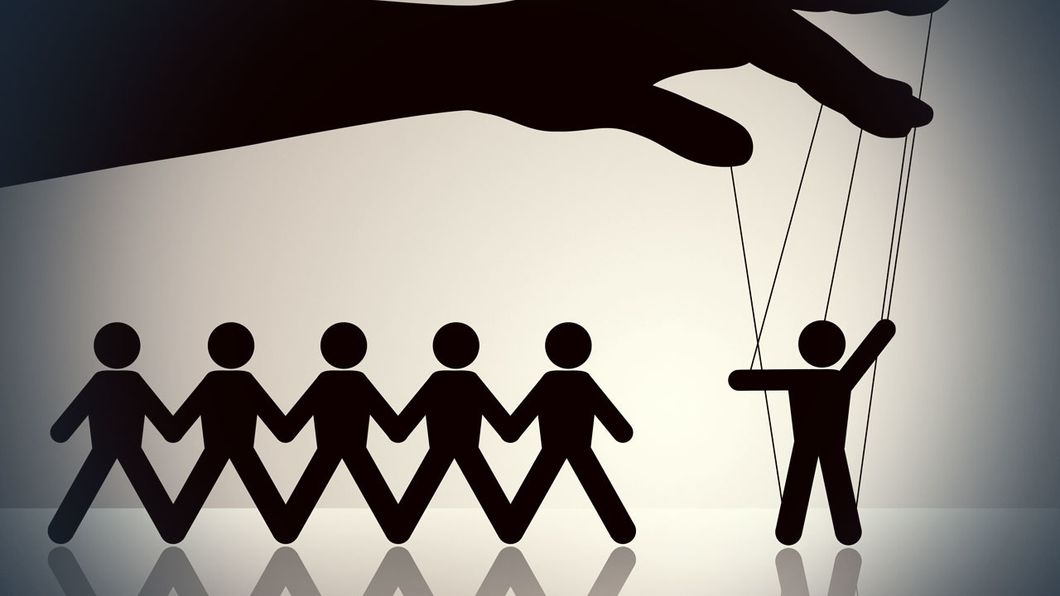If Being Honest Is A Bad Trait, How Many Other Traits Of Mine Are 'Toxic?'
"Honesty is the first chapter in the book of wisdom."
-Thomas Jefferson
I recently was told that I was too honest. As a woman, I am used to being told that I am too much. Too much effort, too emotional, too outspoken, and the list goes on. However, too honest? Is there such a thing in 2019 as being too honest? I didn't think so until recently.
I studied abroad this last semester through a program that offered endless opportunities. One of these opportunities was being able to blog for the program about my experiences abroad, which I was stoked for! However, little did I know that the things I wrote about my experience were too honest and not of good quality for publishing.
When I went abroad there were so many things that I didn't know that I wish I had been told before I arrived. From simple things like how to work public transportation to more complex and dark things like homesickness, depression, and friendships. I wanted to write about the struggles you endure while studying abroad. I didn't want to sugar coat everything that I had experienced, I wanted it to be raw and real for my audience of prospective students. I wanted to convey the challenges that come along with the experience of a lifetime. I thought that conveying my experience through raw humor and sarcasm that my articles would be a hit. The people above me did not.
Upon submitting my first article, "Ten things nobody tells you about studying abroad," I was told that my work was too dark. It was too honest, too personal, and too negative. "We don't want to scare prospective students into not studying abroad. We want to encourage them to come abroad through our program." I totally understand this. I get it. However, what I don't agree with is the fact that you are only advertising the good things that happen when you study abroad. This particular company didn't advertise or educate prospective students on the following things that I wanted to.
-What to do if your passport is stolen
-How to and why you should register your trip abroad with the US Government
-How cell phones work in other countries
-Culture shock!!
-Why the US Embassy in other countries is so important
-What the US Embassy does and where they are located
-Public transportation
-The fact that most water in Europe is undrinkable and therefore you have to budget for water bottles
-How expensive other countries can be
-Healthcare in other countries: How does insurance work? Where does one go for basic illnesses to mental health counseling?
-Counseling services in your area
-Depression and anxiety will come knocking on your door at 3:00 AM- how to handle that
These are just a few things that I wanted answers to after I arrived in London. I strived to write articles for this company that explained these things and more. I wanted my audience of prospective students to hear these things from a study abroad student, not from a fake, plastic prototype that gets paid to say nothing but good things.
Despite the fact that studying abroad has its downs and low points, it is a life changing experience and you really do discover someone that you didn't know existed. Studying abroad teaches you things you can't ever learn in a classroom. Like how to navigate across countries where English isn't the first, second, or even third language of some people. I wanted to write about good things, too. But often times we only get people who write good things. We don't have enough honest writers who are willing to share their raw experiences with a sarcastic and humorous twist. Honest writers and people, in general, are not the worst people. Their work isn't trash or unacceptable for being real.
If being an overly honest, overly emotional and personal woman is the worst insult I receive in these twenty years of life, then I will wear that label across my back in red ink because I am proud to be honest and share my personal experiences with younger generations who have a great curiosity in life. I will strive to be nothing less than overly honest because I would rather be too honest and too blunt than to be a cheat and a liar. But go ahead. Tell me my honesty won't get me very far. Tell me that my raw way of storytelling is twisted and that younger generations don't need to hear it. Younger generations are hungry for information and stories from experienced adults. I am that experienced adult and I will tell younger generations exactly what went right and wrong while studying abroad.


























If Someone Checks Your Racism You're Not The Victim Here, So Here Are Some Tips For Not Acting Like It Either
The way you react to being accused of racism can have a bigger affect than the ignorance in the first place, so here's how to respond in those situations.
Psychology Today defines a "Microaggression" as "everyday verbal, nonverbal, and environmental slights, snubs, or insults, whether intentional or unintentional, which communicate hostile, derogatory, or negative messages to target persons based solely upon their marginalized group membership." To put it more plainly, its anything discriminatory that isn't 100% over.
With that in mind, it may seem to some that literally, everything is off limits to joke about nowadays. While the '90s and early 2000s was full of fake acceptance cloaking heavily problematic stereotypes, assumptions, and misconceptions about marginalized groups, it's left us with a heavy "us vs. them" mentality, with "regular people" on one end and "snowflakes" on the other.
"Snowflake" is a relatively new term commonly employed by conservatives to mock the emerging atmosphere of political correctness, "safe spaces" and the uphill battle minorities face in pursuit of equal rights.
The reason for this, among other things, is the fact that the emerging adult community was raised in the above mentioned standards that were upheld in the '90s and early 2000s. Therefore, we're left with people who think they can, and should get away with anything so long as they aren't waving a Nazi flag or sporting white sheets over their heads.
Studies confirm that many people harbor unconscious racial biases, whether or not they would classify as a full-blown racist.The thoroughly depressing reality of that aside, that along with white guilt, or a sense of shame white people may experience considering the demographic's historical treatment of people of color and other minority peoples, can make racial issues exceptionally difficult to talk about.
With lack of communication comes inevitable ignorance of how a comment, action or opinion may be considered offensive to a marginalized person, leaving many social interactions with both parties angry, sad or even fearful from its outcome.
Ignorance is often not the explicit fault of the ignorant person. However, the problem with today's society is not solely ignorance, nor that people are too sensitive all of a sudden.
For the first time in the nation's history, the social climate allows minority people to be emboldened enough to call people out on their racism. This is a massive societal win for many marginalized groups who no longer have to stand in as a token for their demographic so corporations can meet their diversity quota.
Although, it was clearly not something the bulk of the nation was prepared for.
With the mixture of this newfound liberation for minority groups, an ignorance that has spanned centuries and how difficult people find it to communicate about racial issues, we have the perfect storm for someone to go on the defense instead of treating the accusation of racism as a learning experience.
Thankfully, the concepts behind responding in an appropriate way are pretty straight forward.
1. You Are Not The Victim Here.
There are too many people who get accused of saying something offensive, then immediately go on the defensive. This gets everyone absolutely nowhere.
It probably really sucks to feel like someone thinks you're a terrible person, especially when you didn't realize you were in the wrong. Considering America's history with racism, being singled out for contributing to that is going to bring up a lot of feelings. So naturally, people may turn to arguing and making excuses for the terrible thing they did or said.
The pro-level of this reaction is when a person points out something ignorant or discriminatory, then the accused starts crying.
This immediately takes the attention off of the victim and onto the offender, because the offender then needs to be consoled before any progress in the interaction is made.
Any of these reactions, or feeling that someone is being "mean" to you by checking your ignorance, is a product of white privilege. So, if you care about being a good ally to the marginalized section of our community, its best to save the crying or yelling as a last resort.
2. Apologize First.
Do not pass go, do not collect $200.
Apologizing first, even if you don't understand what you've done, keeps all doors of communication open so you can dig deeper into the situation a little more.
Even if you don't feel remorse—out of ignorance, stubbornness or skepticism—apologizing first acknowledges that they are a human that deserves respect which you've just violated somehow.
Here our pre-school days come in handy, as we can all do well to "treat other's like we want to be treated". Think on how you'd feel if someone disrespected you in the middle of your day, then that empathy should be applied to whomever you've hurt.
If the accused responds in any way besides this, the opportunity for fixing things is annihilated, and the hurt that you both are feeling has no chance of being relieved. Granted, after an apology has been issued and a conversation follows, you might still feel that you're in the right or feel bad in general. However, you still did your best to alleviate some of their discomforts, maintained the cordiality of the relationship and know how to avoid similar situations in the future.
3. Prove To Yourself And Them You're Not A Bad Person
I'm multiracial but look white as hell. I was ignorant as hell as a kid. I've been there where something you said offended when it was clearly not your intention. In fact, in the case of microaggressions, the intent is often not to offend.
So, now it's your job to do your best to prove to them and yourself that you're not a bad person.
The only way to accomplish this is by listening.
Listening to why they were offended, why its a problem and asking questions about the reasons behind it or how to avoid repeating the mistake in the future is the key to growing. And consequentially you might get to learn something that day, which everyone should be thankful for.
Facing these interactions humbly and with an open mind encouraged growth as well as learning, so even though you may feel like crap, this opportunity is definitely a good one.
4. Follow Through
After the badness has happened and been pointed out, an apology has been made and a conversation has been had, the effect of the situation should not end there.
If you're still a little unclear on the offense or want more information, take it upon yourself to watch a Ted Talk or two to keep the conversation going internally.
Then, it's important to actually apply what you've learned to your thoughts, words, and actions. Once it's been pointed out its much easier to identify discriminatory lines of thinking, reconsider previous opinions and even reevaluate how ignorance might be applied to other areas that you hadn't thought of.
If you feel they might still be upset, especially if they're someone you run into often or work with, a check in can go a long way, too. A simple "Hey, I just wanted to make sure you're still OK after the other day" can easy any resentment that might be lingering. Even if that still doesn't fix things, you know you've done everything in your power to make it right.
Even attempting to follow these steps can make all the difference in developing the quality of our interactions a safer society for everyone. Although this may seem like inconsequential in the grander scheme of things, change is truly inspired one baby step at a time, so don't knock it till you try it.